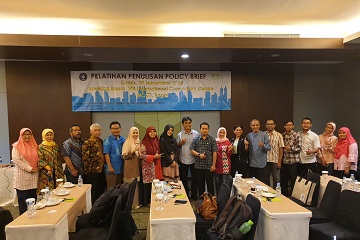IPB Trains Its Academies to Write a Policy Brief

The Institute of Research and Community Service (LPPM) of the Bogor Agricultural University (IPB) held a Policy Brief Writing Training for lecturers, researchers and students on 29/11 at the IPB International Convention Center (IICC), Baranangsiang Bogor IPB Campus. There were 22 participants who passed the registration selection process where one of the main contents was sending a draft policy brief.
Head of the Strategic Studies Division of LPPM IPB, Dr. Akhmad Faqih, said that this training was carried out as part of an effort to increase the number and quality of IPB policy recommendations aimed at providing input for the government and other policy makers, particularly related to the development of the agro-maritime sector.
“Through training like this, it is hoped that it can increase the participation of the IPB academics in an effort to interfere with science to policy, which is still relatively getting little attention from researchers to date. Through this activity, in the future it is hoped that the IPB academic community will be increasingly moved to provide added value and access to various research results and scientific publications through writing policy briefs or various other forms of policy recommendations.
“Strong and systematic support from institutions and leaders is needed to be able to enhance the role of IPB in coloring various policies in this country through strong and quality research,” he said.
The speakers presented at this training were Prof. Dr. Daniel Murdiarso and Prof. Dr. Herry Purnomo. Both have a lot of experience in writing policy briefs. Besides that, both of them are senior researchers at the Center for International Forestry Research (CIFOR) who are known to have an organizational system that is quite capable and productive in producing a variety of quality policy recommendations.
In the material, Prof. Daniel Murdiyarso said that in writing a policy brief, the author must be able to present findings and recommendations from research with only 2-5 pages (1200 words) with a writing style that is easily understood by readers (policy makers). According to informants who have had a lot of experience in government and the world of this research, the results of these writings must be able to present information that is easily digested by readers and writers must be able to present key information that becomes an important point of the message or policy recommendations to be conveyed.
“If it is easily understood quickly and precisely, the target of writing a policy brief will be more easily achieved,” he said.
The same thing was also stated by Prof. Herry Purnomo said that it is most likely that the reader will only read key messages from the policy brief. A good key message only consists of 3-4 points, with a maximum of 30 words per key message. Another important thing emphasized by Prof. Herry is the need to maintain the quality of writing, namely by having a strong scientific reference base by prioritizing the results of research published in the journal Q1. Strong references in writing policy briefs must be the main characteristic of institutions such as IPB.
Previously, IPB’s LPPM had also conducted a popular mass media article writing training which was held as a series of PubliWeek activities on the commemoration of the 55th Anniversary of IPB in September. (RYS)


